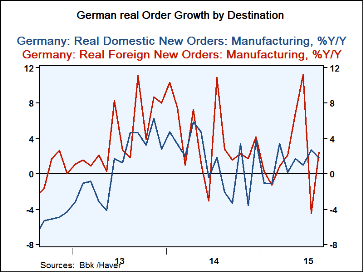 Global| Oct 06 2015
Global| Oct 06 2015German Orders Drop Again in August
Summary
Year-over-year German orders are still advancing but they fell in month-to-month in August for the second month in a row. German orders fell by 1.8% in August after shedding 2.2% in July. Both domestic and foreign orders fell in [...]
 Year-over-year German orders are still advancing but they fell in month-to-month in August for the second month in a row. German orders fell by 1.8% in August after shedding 2.2% in July. Both domestic and foreign orders fell in August but only foreign orders are lower for two months running.
Year-over-year German orders are still advancing but they fell in month-to-month in August for the second month in a row. German orders fell by 1.8% in August after shedding 2.2% in July. Both domestic and foreign orders fell in August but only foreign orders are lower for two months running.
The weakness is severe enough to drive three-month and six months into declines for both domestic and foreign orders. And from 12-mo to 6-mo to 3-mo the pace of growth in both sectors steadily worsens. However, both domestic and foreign orders are still higher year over year.
The chart shows that domestic orders are starting to gain some footing and despite the weakening trends within one year, as the year-over-year growth rates show ongoing improvement. For foreign orders there have been huge swings recently and it is impossible to make any credible statement about trends. But before the volatility set-in foreign orders were weak and weakening.
The large trends (year-over-year) and small trends (within one year) are not yet consistent for Germany. However, for the quarter ahead there is clarity and a lot of weakness. Domestic orders are up at a 3.6% pace but foreign orders dominate with a 17.4% pace of decline pulling overall orders lower at a 9.2% annual rate in the quarter-to-date.
Real sector sales showed widespread weakness over three months and six-months. The exception is for consumer durable goods where sales are rising on both horizons. But all other sales rates are negative and worsening from 6-months to three-months. Sales are higher year over year for all sectors except consumer non-durables. Manufacturing sales - taken as a whole - show sales higher on 12-months, lower on six months, and even weaker on 3-months, a clear pattern of deceleration.
The German economy which is export-dependent is getting hit hard by the transmission effects from its foreign customers as China and commodities-producing countries show extreme weakness. While German exports are still very efficient and highly competitive, demand is simply imploding around the world and that weakness spreads through the export channel to Germany.
Policymakers are hoping that they can cling to monetary accommodation to turn the corner back to growth. But that tact has not been decisive. And global economic conditions continue to show highs and lows. In the U.K., for example, there are record vehicle registrations. While the developed economies continue to limp, vehicle registrations and sales seem to have held up surprisingly well in the U.K., in the U.S., and in the rest of Europe. Yet in South Africa, a commodities producing country, business confidence has fallen to a 1993 low! And while there are a few pockets of strength reported today there are many more indications of weakness (India's private sector at a three month low, Hong Kong's private sector is shrinking). Weak exports are spreading that weakness from developing to developed countries. And it's a question whether the monetary inoculations of central banks will be enough to protect the developing economies from the spread of this debilitating flu.

Robert Brusca
AuthorMore in Author Profile »Robert A. Brusca is Chief Economist of Fact and Opinion Economics, a consulting firm he founded in Manhattan. He has been an economist on Wall Street for over 25 years. He has visited central banking and large institutional clients in over 30 countries in his career as an economist. Mr. Brusca was a Divisional Research Chief at the Federal Reserve Bank of NY (Chief of the International Financial markets Division), a Fed Watcher at Irving Trust and Chief Economist at Nikko Securities International. He is widely quoted and appears in various media. Mr. Brusca holds an MA and Ph.D. in economics from Michigan State University and a BA in Economics from the University of Michigan. His research pursues his strong interests in non aligned policy economics as well as international economics. FAO Economics’ research targets investors to assist them in making better investment decisions in stocks, bonds and in a variety of international assets. The company does not manage money and has no conflicts in giving economic advice.






